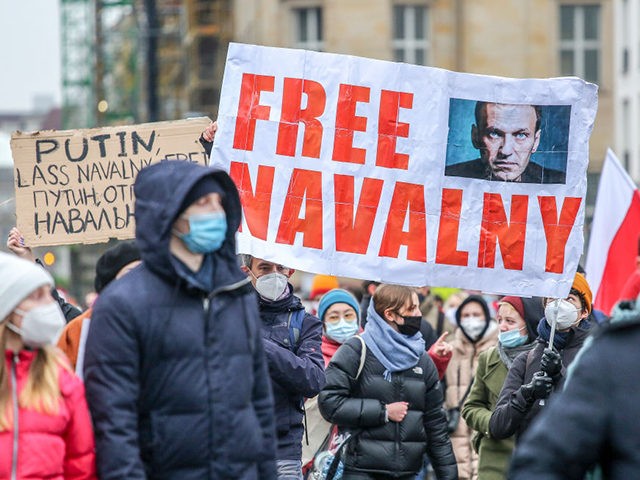Jailed opposition leader Alexei Navalny got the massive demonstrations he asked for over the weekend, as gigantic crowds assembled in most of Russia’s major cities, prompting an equally massive crackdown from the police against “unsanctioned” public events.
Western governments protested against the mass arrests, while the Kremlin insisted foreign powers should stop meddling in Russia’s internal affairs.
The Moscow Times wryly noted Russia’s Interior Ministry spent the weekend frantically attempting to downplay the size of the protests. The demonstrations in Moscow and St. Petersburg, for example, clearly appeared to be much larger than the 4,000 or so claimed by the Interior Ministry.
The demonstrations also skewed much older than the Russian government’s narrative about excitable students rushing out to enjoy a bit of street theater at the urging of Navalny and his young squad of provocateurs. The Moscow Times chatted with older participants who said they took to the streets because they worried about the future of their children under the seemingly endless rule of President Vladimir Putin and his allies, whom Navalny has denounced as corrupt oligarchs.
On that subject, Navalny’s anti-corruption expose concerning the lavish Black Sea “palace” allegedly built for Putin by his cronies, released after Navalny returned to Russia after treatment for poisoning in Germany and was immediately arrested, has racked up over 70 million views online and was cited as an inspiration by many of the demonstrators who spoke to the Moscow Times:
Vladimir, 15, one of a group of boys smoking cigarettes a few steps from riot police, was attending his first protest despite warnings from his school. He said his motivation for coming out was poverty, as his disabled parents and grandmother only receive 15,000 rubles ($200) a month from the government, which barely covers Moscow rent.
“I am against corruption in our country. I don’t like low salaries, low pensions, the fact that the government is stealing and then lying to us,” he said.
Other protesters said they had marched for different causes in the past.
“For me, doing nothing is tantamount to collusion with the authorities,” said Artyom Manteev, a 25-year-old translator and committed Navalny supporter who attended last summer’s small protests against constitutional amendments that reset the clock on Putin’s term limits, allowing the president to stay in office until 2036.
A common lament of the demonstrators, and evidently a growing problem for Putin and his allies, is that Russia’s impressive resources have been plundered and most of the wealth has gone to Putin’s ultra-rich inner circle.
“Russia is one of the richest countries in the world, we have a lot of natural resources. But ordinary people can’t profit from it, only Putin and his friends can,” one student demonstrator said.
Other demonstrators cited Navalny’s narrow survival after exposure to chemical weapons, and his arrest upon returning to Russia, as the reason they took to the streets. Some of those demonstrators said they were not supporters of Navalny, but they were frightened by the steps taken to silence him. One of the clashes between protesters and police occurred outside the notorious Matrosskaya Tishina prison where Navalny has been jailed.
At least 3,700 detentions were on the books as of Monday morning, with criminal charges of violence or vandalism filed in 15 cases. 120 cities across Russia saw demonstrations over the weekend, including locations in the most remote and inhospitable regions of Russia. The BBC ran photos of impressive turnout in Omsk, where the temperature was 22 below zero on Saturday, and even in Yakutsk in Siberia, where it was 60 below zero.
Video footage of both police beating protesters, and vice versa, quickly began circulating online:
The charges against other protesters include participating in unsanctioned public demonstrations, blocking traffic, and violating coronavirus social distancing rules. Detainees in Moscow included Alexei Navalny’s wife Yulia and his senior aide, Lyubov Sobol. Numerous other members of his organization were arrested for organizing the protests.
The New York Times saw the protests as a signal of “widespread fatigue with the stagnant, corruption-plagued political order that Mr. Putin has presided over for two decades,” although it judged there was no immediate threat to Putin’s grip on power.
Navalny’s aide Leonid Volkov promised more demonstrations will be held next weekend despite more threats to arrest the participants.
“If Putin thinks the most frightening things are behind him, he is very sorely and naïvely mistaken,” Volkov said.
Russia’s crackdown on the protesters was denounced by the United States and European nations, along with international human rights organizations. The U.S. State Department “strongly condemned the use of harsh tactics against protesters and journalists.”
“We call on Russian authorities to release all those detained for exercising their universal rights and for the immediate and unconditional release of Aleksey Navalny. We urge Russia to fully cooperate with the international community’s investigation into the poisoning of Aleksey Navalny and credibly explain the use of a chemical weapon on its soil,” the State Department said.
U.K. Foreign Secretary Dominic Raab issued a similar statement, condemning “the Russian authorities’ use of violence against peaceful protesters and journalists” and calling for the release of those imprisoned.
The Kremlin denounced the U.S. Embassy in Moscow for making statements in support of the protesters over the weekend and told foreign governments to stop interfering in Russia’s internal affairs.
Kremlin spokesman Dmitry Peskov said the U.S. Embassy’s words of support for the protesters “indirectly constitute absolute interference in our internal affairs” and directly support the violation of Russian law.
“Now, many will say that many people came out for the illegal actions. No, few people came out. Many people vote for Putin,” Peskov grumbled.

COMMENTS
Please let us know if you're having issues with commenting.